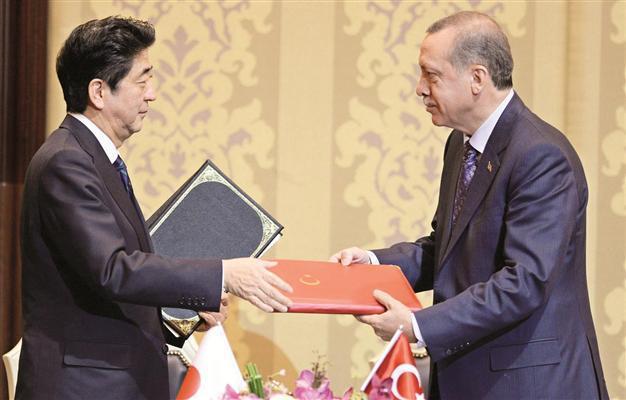Marmaray marks warm Turkey-Japan ties: Abe
Şükrü Küçükşahin ANKARA /TOKYO - Hürriyet

This file photo shows Turkish PM Erdoğan (R) with his Japanese counterpart, Abe, during a Japan-Turkey Business Council meeting in Ankara. DAILY NEWS photo, Selahattin SÖNMEZ
Japanese Prime Minister Shinzo Abe has said he hopes Istanbul’s Marmaray tunnel project, which is being built with substantial Japanese involvement, will become a new symbol of the two countries’ friendship.“This project [Marmaray] has been accomplished thanks to the cooperation of Japan’s high-technology and Turkey’s experienced labor power,” the Japanese prime minister told daily Hürriyet in a written interview. “The upcoming year is the 90th anniversary of diplomatic relations between Turkey and Japan. I hope this project will be the new symbol of the two countries’ friendship.”
Speaking ahead of his attendance at the opening ceremony of the project tomorrow, Abe said the project that will connect the Asian and European sides of Istanbul via a tunnel passing under the Bosphorus was also significant as it will link two continents.
The Japanese have had a great role in almost every stage of the Marmaray tunnel. The contractor of the tunnel is a Japanese-Turkish consortium, TGN, which consists of Japan’s Tansei as well as its Turkish project partners, Nurol and Gama.
A substantial portion of the financing for the project, which is expected to cost around 9.3 billion Turkish Liras ($4.5 billion) after everything is completed, was provided by the Japan Bank for International Cooperation (JBIC).
Although the European Investment Bank (EIB) has allocated funds to the project as well, the lion’s share came from the JBIC.
Abe said his country had spent more than $1.45 billion for the realization of the project since 1999, when the JBIC and Turkey signed a financing agreement.
The 13.6-kilometer tunnel, including a 1.4-kilometer immersed tube tunnel, which is the deepest of its kind in the world at 56 meters, is not the first mega project for which Turkish and Japanese companies have joined forces.
The construction of Istanbul’s Fatih Sultan Mehmet Bridge and an under-construction highway and a bridge passing through İzmit Gulf have also included significant Japanese involvement.
Abe said firms from his nation would like to take part in future projects that the Turkish government ambitiously wants to develop in the near future.
“We are aware that Turkey, which will celebrate its 100th anniversary in 2023, is planning to actualize a number of infrastructure projects. And Japanese firms are paying a great deal of attention [to that],” he said.
Win-win partnerships
He also said he had “no doubt” that the Japanese private sector would have a warmer perception of Turkey as an alluring market after the contacts Japanese firms will make during his Turkey visit.
The prime minister also noted his wish for “Japanese-Turkish businesses’ cooperation to be extended into investments in third countries, such as Iraq.”
“As of now, Japan, as a single body, made up of public and private sectors, desires to establish a win-win relationship that will lead both countries to success by supporting Japanese firms’ [landing contracts] abroad,” he said.
Meanwhile, touching upon the Olympic rivalry between the two nations that ended with Tokyo’s victory against Istanbul in the race to host the 2020 Games, Abe said the fact that Prime Minister Recep Tayyip Erdoğan was the first person to hug him after the announcement for Tokyo had impressed many Japanese people.
















